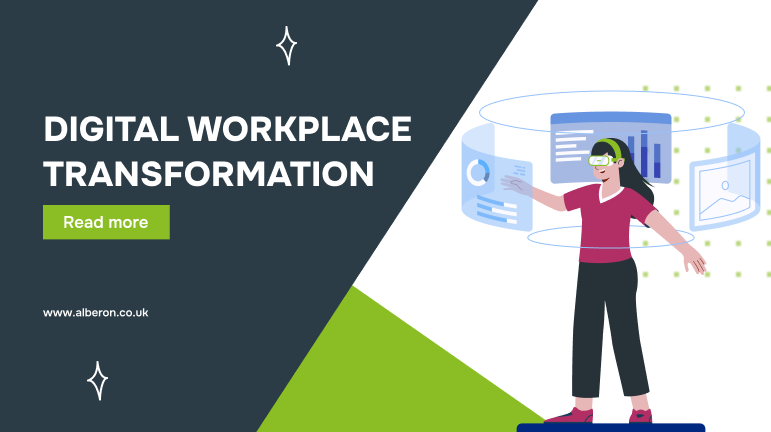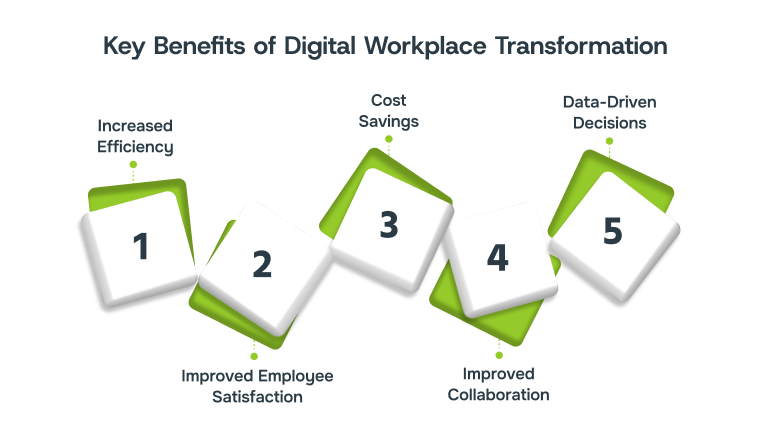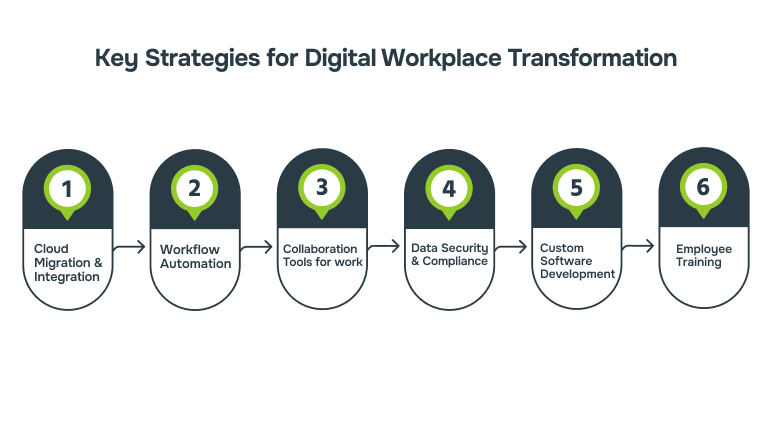Digital Workplace Transformation: Definition and Key Strategies
Boost productivity and team communication with digital workplace transformation. Explore key benefits, challenges, and future-proofing tips. Start today!

“Successful digital transformation is 10% tech and 90% change management.” — Barry Ross
Why stay stuck when everything around us is moving forward?
We understand that starting digital transformation can feel daunting, especially with outdated or disconnected systems. But you’re not alone in facing these challenges. The way we work has changed, and it’s only moving forward. In this new reality, remote work and digital collaboration are now part of everyday life. To stay competitive, businesses must transform their work processes.
According to McKinsey research, around 90% of organisations are currently in the process of digital transformation in some form.
Digital workplace transformation is essential for modernising operations, automating tasks, and improving productivity. Upgrading legacy systems or moving to cloud solutions helps businesses stay ready for the future. In this blog, let’s explore how digital workplace transformation is reshaping the way we work.
What is Digital Workplace Transformation?
A Digital Workplace is a modern version of the traditional office. It uses digital tools to help employees work, communicate, and collaborate from anywhere. Cloud software, messaging apps, and workflow automation are key parts of this setup.
Digital Workplace Transformation means using technology to change how a company works. It helps teams communicate better, work faster, and make smarter decisions. Studies show that the digital transformation market is projected to grow at a CAGR of 14.72% between 2024 and 2029, reaching an estimated value of $94.07 billion by 2029. This transformation involves:
- Adopting Modern Tools and Platforms: Utilise platforms like Slack, Microsoft Teams, or Microsoft 365 Solutions to improve communication and collaboration across teams, whether in the office or working remotely.
- Automating Manual Processes: Use Microsoft Dynamics Solutions to automate tasks like approvals, notifications, and reporting. This reduces manual work and helps your team focus on what matters most.
- Ensuring Security and Compliance: Utilising custom software development ensures high security and compliance with built-in access controls and data encryption. In addition, it’s ideal for handling sensitive operations.
- Empowering Employees: Give your team cloud-based tools and digital dashboards so they can work efficiently from anywhere.
By utilising the right strategies and technologies, businesses can modernise their operations and overcome the limitations of outdated systems, setting the stage for long-term success.
Why Digital Workplace Transformation Matters?
Today, businesses can’t afford to rely on outdated systems or old ways of working. Digital workplace transformation is key for many reasons.
- Stay Competitive: Modern tools and smarter processes help teams work faster, cut costs, and make better decisions. This keeps you one step ahead of the competition.
- For example, a retail company using cloud-based inventory management can restock faster and avoid lost sales. Something legacy systems often fail at.
- Why it matters: Real-time insights cut delays, reduce human error, and improve decision-making on the fly.
- Be More Adaptable: Markets shift, customer needs change, and new challenges arise. A digital setup helps your business respond quickly and stay flexible.
- 74% of organisationsnow see digital transformation as a key business priority.
- 86% of organisations believe workplace transformation improves team collaboration.
- Prepare for the Future: As tech evolves with AI, automation, and remote work, your systems must keep up. Digital transformation helps you stay ready for what’s next.
- For example, a growing retail company used AI-powered analytics to predict customer demand more accurately. By integrating cloud-based tools, they automated inventory management and improved delivery timelines. This shift not only cut costs but also boosted customer satisfaction.
“Digital transformation is a fundamental reality for businesses today.” — Warren Buffett
Now, let’s examine the benefits that digital workplace transformation can offer your business.
Key Benefits of Digital Workplace Transformation

Digital workplace transformation brings real, measurable benefits. Here are some key advantages businesses can gain from making the shift.
- Increased Efficiency: By automating repetitive tasks and integrating systems, businesses can significantly reduce the time spent on manual processes, allowing employees to focus on higher-value activities.
- Improved Employee Satisfaction: Modern, flexible work environments with access to cutting-edge tools improve employee engagement and job satisfaction, which can lead to better retention rates.
- Cost Savings: Cloud solutions and workflow automation can lower infrastructure costs and reduce the need for extensive IT maintenance, leading to overall cost reduction.
- Improved Collaboration: With the right tools in place, employees can collaborate more effectively, regardless of location, leading to faster decision-making and improved project outcomes.
- Data-Driven Decisions: With integrated systems and improved data accessibility, businesses can make more informed, data-driven decisions, which improves overall business performance.
While the benefits are clear, the path to digital transformation comes with its own set of challenges.
Key Components of a Digital Workplace
A digital workplace is built on several essential elements that enable teams to work more efficiently, flexibly, and collaboratively. Below are the core components that define a successful digital workplace environment.
1. Tools
Digital tools improve work quality and support remote teams. They boost productivity and help employees stay connected.
Examples include:
- Communication: Slack, Zoom
- Collaboration: Google Docs, Quip
- Project Management: Jira, Asana
- Knowledge Management: Confluence, Guru
- CRM Systems: Salesforce, SAP CRM
- HR Tools: Workday, SuccessFactors
2. Communication
Good communication is vital in a digital workplace. It enables teams to share ideas quickly, regardless of their location. Two-way platforms facilitate smooth and clear collaboration.
3. Analytics
Analytics help turn data into useful insights. They support smarter decisions and better strategies. These tools help businesses stay competitive and track performance.
4. People
People are the most valuable part of any digital workplace. Empowering employees with the right tools and access is key to better performance. A digital workplace helps staff manage knowledge, collaborate easily, and access data from any location or device using cloud systems.
You can support employees by:
- Providing tools to spot cross-sell and up-sell opportunities.
- Enabling faster product research, development, and delivery.
- Making information easy to find for better customer service.
- Giving employees the right tools to carry out business processes.
- Ensuring they have what they need, when they need it.
5. Management
Managing digital work means keeping track of tasks and progress. This is especially important when teams are spread out.
Key areas include:
- Project Management: Set rules and steps to complete a project.
- Case Management: Use workflows and team input to handle complex tasks.
- Process Management: Review and improve how work is done.
Key Strategies for Digital Workplace Transformation

To successfully transform your workplace, businesses need to take a strategic approach. Here are six key strategies for driving digital workplace transformation:
1. Cloud Migration and Integration
Migrating to the cloud is essential for businesses that need to scale and future-proof their operations. Cloud-based solutions provide flexibility, security, and better integration across platforms.
- Legacy systems are often not scalable and require significant maintenance. Cloud solutions, such as Microsoft Dynamics and Microsoft 365, allow businesses to centralise data, automate workflows, and improve collaboration across departments.
- Strategy in Action: A seamless transition to cloud-based platforms enables real-time access to business data, improving decision-making and operational efficiency.
2. Workflow Automation
Automating repetitive tasks is key to increasing productivity and reducing operational inefficiencies.
- Manual processes consume valuable time and are prone to errors. Automating tasks such as data entry, approval processes, and customer management reduces overhead costs and frees up resources for more strategic work.
- Strategy in Action: Microsoft Dynamics allows businesses to automate key workflows, enabling smoother, faster operations across departments.
3. Collaboration Tools for Remote and Hybrid Work
The rise of remote and hybrid working models has made it crucial for businesses to have the right tools for communication and collaboration.
- Too many communication tools can lead to misunderstandings and inefficiencies. Integrated platforms like Microsoft Teams, Outlook, and SharePoint allow teams to collaborate seamlessly, regardless of location.
- Strategy in Action: These platforms enable real-time messaging, video conferencing, and document sharing, improving communication and fostering collaboration across teams.
4. Data Security and Compliance
As businesses move more of their operations online, ensuring robust data security and compliance with regulations is essential.
- Cybersecurity threats and regulatory requirements (e.g., GDPR) mean businesses must adopt secure systems that protect sensitive data and maintain compliance.
- Strategy in Action: Leveraging secure cloud services and compliance-ready solutions like Microsoft 365 helps protect critical business information and mitigate potential risks.
5. Utilise Custom Software Development
Custom software development offers tailored solutions that integrate seamlessly with existing tools and platforms.
- Custom solutions ensure that your business gets exactly what it needs, improving workflow efficiency and scalability.
- Strategy in Action: Creating a custom CRM, ERP system, or integrating existing platforms enables businesses to build the ideal digital environment tailored to their unique needs.
6. Employee Training and Empowerment
Even the best tools are ineffective if employees don’t know how to use them effectively. Training is critical to ensure that your workforce is equipped to leverage new systems to their full potential.
- Proper training boosts employee confidence, enhances productivity, and ensures that your business gets the maximum return on investment from your digital tools.
- Strategy in Action: Regular training sessions, system usage workshops, and post-deployment support ensure that your team can navigate the tools and maximise their benefits.
Challenges & Solutions in Digital Workplace Transformation
Digital workplace transformation presents significant opportunities, but it also comes with its share of challenges. Common challenges and their solutions include.
| Challenge | Solution |
|---|---|
| Security & Data Privacy | Invest in strong cybersecurity. Train staff on best practices. Set clear access controls. |
| Tool Integration Issues | Choose tools that integrate well. Use APIs or middleware. Have a clear integration strategy. |
| Resistance to Change | Communicate benefits. Offer training and support. Build a culture open to change. |
| Inconsistent User Experience | Use responsive, mobile-friendly tools. Test across devices for consistency. |
| Managing Remote Teams | Use tools like Teams or Slack. Set clear expectations. Run regular check-ins and virtual team building. |
| Keeping up with the Latest Technology | Pick scalable, upgradable tools. Partner with vendors for updates. Review tech stack regularly. |
| Measuring ROI | Define success metrics early (e.g., cost savings, productivity). Use analytics to track and refine. |
| Productivity vs. Employee Well-being | Set boundaries. Encourage breaks. Promote mental health and lead by example. |
Addressing these challenges starts with the right strategies to lead a successful digital workplace transformation.
Case Studies of Digital Workplace Transformation
Below are some real-world examples from leading organisations that have successfully embraced digital tools and strategies.
1. Kent County Council & University of Kent: Advancing Digital Accessibility
Challenge: Many public sector websites are hard to use for people with disabilities. Kent County Council needed to make its digital services more accessible and legally compliant.
Solution: In 2019, the council partnered with the University of Kent. They worked to improve accessibility across all digital platforms. The team carried out website audits and created clear accessibility statements using plain English. They also built e-learning modules and guides for staff and the public.
The council updated its procurement process. Now, all suppliers must meet key accessibility standards.
- Web Content Accessibility Guidelines (WCAG)
- ISO standards for digital interoperability
- The Equality Act
- Public Sector Bodies Accessibility Regulations
Impact: Digital services are now easier to use for everyone. Staff and suppliers understand the importance of accessibility. The council meets government rules and offers better experiences for all users.
2. Cornwall Council: Building a Digital County
Challenge: Cornwall Council ended its partnership with a major network provider. This exposed critical gaps in its outdated IT systems. The Council needed a complete digital overhaul to protect public services and improve efficiency.
Solution: Through the Digital Cornwall project, the Council brought its IT services in-house. It introduced virtual meeting tools, modern email platforms, mobile access, and public Wi-Fi. Interactive devices improved communication and flexibility for staff. Office spaces were redesigned to support a new way of working. Staff training methods were also updated to support this cultural shift.
Impact:
- Saved £2 million across the organisation
- Moved 1.5 million resident transactions online
- Fostered a culture of innovation within the Council
Today, Cornwall is using smart data tools to manage traffic and improve accessibility. Community leaders are named as digital champions.
Discover how a custom web-based data management system and SharePoint enhancements helped Hertford College, University of Oxford, streamline internal operations and centralise key information. [Read the full case study here]
Future Trends in Digital Workplace Transformation
As digital workspaces evolve, these key trends are reshaping how organisations operate. These are backed by real-world data from the UK and beyond:
- AI and Workflow Automation: Automation is transforming repetitive tasks. By 2025, automation is expected to handle 69% of routine tasks, with 85% of customer interactions being managed by bots.
- Upskilling for the AI Era: AI offers a massive opportunity, but only with skilled people. In the UK, the government plans to train 7.5 million workers in AI by 2030.
- Rise of Hybrid and Remote Work Models: The COVID-19 pandemic fast-tracked remote work adoption, leading many organisations to embrace a hybrid model. This flexible approach improves work-life balance, cuts commute time, and boosts productivity. According to a McKinsey survey,58% of executives state that hybrid work models have led to increased individual productivity.
- Smarter Collaboration & Communication Tools: Cloud-based platforms are now central to how teams connect and collaborate. Organisations using these solutions report a 15% boost in employee engagement and cut down meeting-related inefficiencies by 30%, thanks to streamlined workflows and fewer communication delays.
- Investment in Cyber‑Security: The UK government has announced up to £16 million in new funding to support the growth of the cybersecurity sector. 40% of UK tech companies are prioritising cybersecurity investment.
How Alberon Supports Digital Workplace Transformation?
At Alberon, we recognise the unique challenges businesses face when transitioning to a digital workplace. Our mission is to help organisations modernise their operations by providing customised solutions, designed to automate workflows, integrate systems, and offer real-time data insights.
From manufacturing companies looking to integrate ERP systems, to financial firms that require secure data management, and non-profits in need of scalable, cost-effective platforms, our IT consulting services are tailored to meet the specific needs of each sector.
Key Services Include:
- Microsoft Dynamics 365 Solutions: We offer tailored CRM and ERP solutions, with full business management capabilities, end-to-end integration, real-time data sharing, and process automation, ensuring a smooth digital transformation.
- Cloud Services: We provide scalable and secure cloud migration solutions that reduce costs and support business growth, allowing you to benefit from enhanced flexibility and scalability.
- Custom Software Development: Our team creates bespoke software solutions that perfectly align with your business requirements, seamlessly integrating with your existing systems to optimise performance.
- IT Consulting & Support: Our expert consultants help align your technology with your business goals. We also provide ongoing support, training, and disaster recovery solutions, ensuring long-term success and minimal downtime during the transformation process.
Conclusion
Digital workplace transformation isn’t just a trend; it’s a necessity. It’s essential for staying agile, competitive, and future-ready. By adopting the right tools, strategies, and mindset, businesses can unlock greater efficiency, security, and collaboration. The challenges are real, but with expert support, they’re manageable. At Alberon, we’re here to help you take the next step with clarity and the right tools.
Discover how tailored digital solutions can streamline your operations and drive growth. Contact us today to start your transformation journey.
Get in Touch Today:
Ready to Improve your Business Productivity
Get a trusted partner to navigate your digital transformation. With Alberon, you can ensure a smooth transition, clear communication, and peace of mind.
